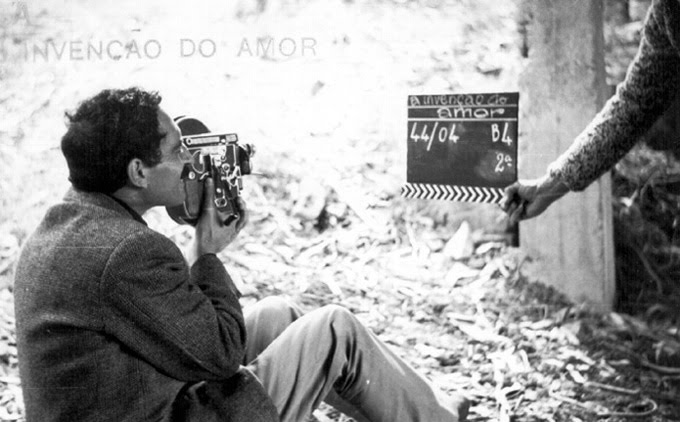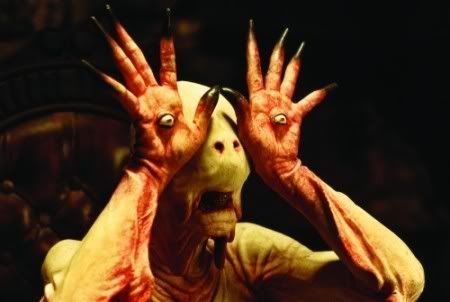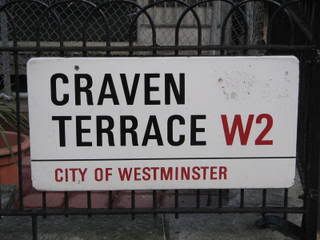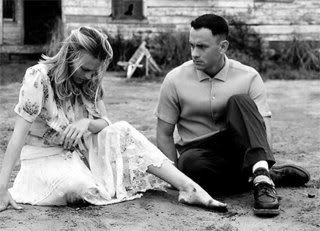28 março 2007
Music and Lyrics

Desde o Everyone Says I Love You que não a ouvia cantar e soube-me tão bem. E o Hugh Grant? A provar que ainda pode contribuir para a evolução da comédia romântica?
Quem diria?
27 março 2007
Ciclo Paul Bowles – CCB
The Sheltering Sky ou Um Chá no Deserto
Bernardo Bertolucci
Port Moresby: Could you be happy here?
Kit Moresby: Happy? Happy? How do you mean?
Narrator: Because we don't know when we will die, we get to think of life as an inexhaustible well, yet everything happens only a certain number of times, and a very small number, really. How many more times will you remember a certain afternoon of your childhood, some afternoon that's so deeply a part of your being that you can't even conceive of your life without it? Perhaps four or five times more, perhaps not even that. How many more times will you watch the full moon rise? Perhaps twenty. And yet it all seems limitless.

Pequeno Auditório cheio. Pessoas sentadas pelas escadas. Debra Winger no ecrã – que saudades desde Shadowlands. Lá está ela, chamam-lhe Kit Moresby. Incrível, lânguida, a sofrer por uma morte pressagiada. Mais tarde, depois da consumação daquela, há-de recusar o encontro com o luto.
Ciclo Paul Bowles – CCB
Confissão
É verdade que fiquei irritada com o Daniel Blaufuks depois de ter visto o documentário Um Pouco Mais Pequeno que o Indiana. Mas também é verdade que acabo de me reconciliar com o seu trabalho. A pequena exposição de fotografias a preto e branco, tiradas em Tânger, que está em exibição no CCB é qualquer coisa de extraordinário. Até 22 de Abril.
É verdade que fiquei irritada com o Daniel Blaufuks depois de ter visto o documentário Um Pouco Mais Pequeno que o Indiana. Mas também é verdade que acabo de me reconciliar com o seu trabalho. A pequena exposição de fotografias a preto e branco, tiradas em Tânger, que está em exibição no CCB é qualquer coisa de extraordinário. Até 22 de Abril.
21 março 2007
20 março 2007
Grandes filmes
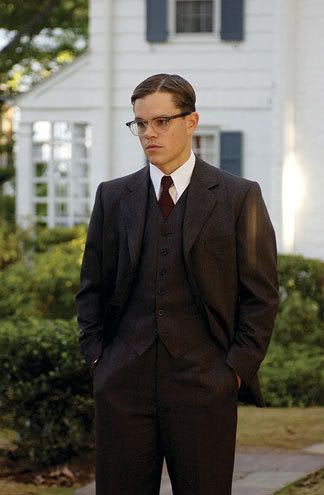
A propósito da crítica de Jorge Mourinha em relação ao The Good Shepherd, há um parágrafo que não me sai da cabeça – Foi uma longa viagem para pôr o projecto de pé, para se debater com a indiferença de uma crítica displicente para com o filme, com o desinteresse do público, com a injustíssima ausência dos Óscares. Sejamos realistas: não é um grande filme, e não é só Coppola que nos vem à cabeça – há algo da desmesura de Oliver Stone nos seus tempos áureos, no desafio louco de entrecruzar o público e o privado, a Grande História e as pequenas histórias.
Assinaria por baixo se não fosse esta curta frase: Sejamos realistas: não é um grande filme. O que falta então a The Good Shepherd para ser um grande filme? O que querem os críticos? Não sei, não compreendo e, mais uma vez, prefiro ignorá-los. Robert De Niro surpreende com uma realização irrepreensível, sem movimentos de câmara excessivos. Nada falha ao longo de 167 minutos de uma segurança inabalável, entre flashbacks e flashforwards, reconstituições históricas, silêncios e mortes.
Recordo-me de que, aqui há bem pouco tempo, os críticos aplaudiram The Black Dahlia e nem levaram em conta as sucessivas incoerências de Brian De Palma. Pelo contrário, compararam-no quase automaticamente a obras-primas como Double Indemnity ou Out of the Past. Ora bem, eis que hoje acordei a pensar em The Good Shepherd e no quanto gostei dele. Para quem me conhece, há certos pormenores que facilmente me conquistam. Não é todos os dias que vejo a Angelina Jolie a abdicar do seu lado carnal para se transformar numa espécie de mártir mal-amada. Também não é todos os dias que reencontro Joe Pesci, John Turturro e William Hurt. Mas garanto que não foi só o elenco que me subjugou.
Na minha relação com o cinema, ando sempre à procura de películas que questionem os limites do cinema, que é como quem diz, os limites da vida. E confesso que me senti agradecida com a personagem de Matt Damon. (Permitam-me a ressalva: a minha relação com o cinema está longe de ser consequente. Houve alturas em que só a presença de Matt Damon em “coisas” como o Good Will Hunting era suficiente para me afastar do ecrã.) Um homem que nunca pôde planear a sua vida, um homem que nunca pôde tomar decisões, um homem que nunca teve controlo sobre si. E que, no entanto, sempre agiu de acordo com um cerradíssimo código moral, representando assim o estereótipo da rectidão, desde o caminho que percorre até à impecabilidade dos seus fatos, cabelo e óculos. É o tal Bom Pastor que tudo sacrifica em prol de um bem maior. Haverá homens assim? De repente, ocorrem-me o Montgomery Clift do I Confess e o David Strathairn do Good Night, and Good Luck. Grandes filmes, tal como The Good Shepherd.
Assinaria por baixo se não fosse esta curta frase: Sejamos realistas: não é um grande filme. O que falta então a The Good Shepherd para ser um grande filme? O que querem os críticos? Não sei, não compreendo e, mais uma vez, prefiro ignorá-los. Robert De Niro surpreende com uma realização irrepreensível, sem movimentos de câmara excessivos. Nada falha ao longo de 167 minutos de uma segurança inabalável, entre flashbacks e flashforwards, reconstituições históricas, silêncios e mortes.
Recordo-me de que, aqui há bem pouco tempo, os críticos aplaudiram The Black Dahlia e nem levaram em conta as sucessivas incoerências de Brian De Palma. Pelo contrário, compararam-no quase automaticamente a obras-primas como Double Indemnity ou Out of the Past. Ora bem, eis que hoje acordei a pensar em The Good Shepherd e no quanto gostei dele. Para quem me conhece, há certos pormenores que facilmente me conquistam. Não é todos os dias que vejo a Angelina Jolie a abdicar do seu lado carnal para se transformar numa espécie de mártir mal-amada. Também não é todos os dias que reencontro Joe Pesci, John Turturro e William Hurt. Mas garanto que não foi só o elenco que me subjugou.
Na minha relação com o cinema, ando sempre à procura de películas que questionem os limites do cinema, que é como quem diz, os limites da vida. E confesso que me senti agradecida com a personagem de Matt Damon. (Permitam-me a ressalva: a minha relação com o cinema está longe de ser consequente. Houve alturas em que só a presença de Matt Damon em “coisas” como o Good Will Hunting era suficiente para me afastar do ecrã.) Um homem que nunca pôde planear a sua vida, um homem que nunca pôde tomar decisões, um homem que nunca teve controlo sobre si. E que, no entanto, sempre agiu de acordo com um cerradíssimo código moral, representando assim o estereótipo da rectidão, desde o caminho que percorre até à impecabilidade dos seus fatos, cabelo e óculos. É o tal Bom Pastor que tudo sacrifica em prol de um bem maior. Haverá homens assim? De repente, ocorrem-me o Montgomery Clift do I Confess e o David Strathairn do Good Night, and Good Luck. Grandes filmes, tal como The Good Shepherd.
12 março 2007
My song
A long, long time ago...
I can still remember
How that music used to make me smile.
And I knew if I had my chance
That I could make those people dance
And, maybe, they’d be happy for a while.
But February made me shiver
With every paper I’d deliver.
Bad news on the doorstep;
I couldn’t take one more step.
I can’t remember if I cried
When I read about his widowed bride,
But something touched me deep inside
The day the music died.
So bye-bye, miss american pie.
Drove my chevy to the levee,
But the levee was dry.
And them good old boys were drinkin’ whiskey and rye
Singin’, "this’ll be the day that I die.
"this’ll be the day that I die."
Did you write the book of love,
And do you have faith in God above,
If the Bible tells you so?
Do you believe in rock ’n roll,
Can music save your mortal soul,
And can you teach me how to dance real slow?
Well, I know that you’re in love with him
`cause I saw you dancin’ in the gym.
You both kicked off your shoes.
Man, I dig those rhythm and blues.
I was a lonely teenage broncin’ buck
With a pink carnation and a pickup truck,
But I knew I was out of luck
The day the music died.
I started singin’,
"bye-bye, miss american pie."
Drove my chevy to the levee,
But the levee was dry.
Them good old boys were drinkin’ whiskey and rye
And singin’, "this’ll be the day that I die.
"this’ll be the day that I die."
Now for ten years we’ve been on our own
And moss grows fat on a rollin’ stone,
But that’s not how it used to be.
When the jester sang for the king and queen,
In a coat he borrowed from james dean
And a voice that came from you and me,
Oh, and while the king was looking down,
The jester stole his thorny crown.
The courtroom was adjourned;
No verdict was returned.
And while Lennon read a book on Marx,
The quartet practiced in the park,
And we sang dirges in the dark
The day the music died.
We were singing,
"bye-bye, miss american pie."
Drove my chevy to the levee,
But the levee was dry.
Them good old boys were drinkin’ whiskey and rye
And singin’, "this’ll be the day that I die.
"this’ll be the day that I die."
Helter skelter in a summer swelter.
The birds flew off with a fallout shelter,
Eight miles high and falling fast.
It landed foul on the grass.
The players tried for a forward pass,
With the jester on the sidelines in a cast.
Now the half-time air was sweet perfume
While the sergeants played a marching tune.
We all got up to dance,
Oh, but we never got the chance!
`cause the players tried to take the field;
The marching band refused to yield.
Do you recall what was revealed
The day the music died?
We started singing,
"bye-bye, miss american pie."
Drove my chevy to the levee,
But the levee was dry.
Them good old boys were drinkin’ whiskey and rye
And singin’, "this’ll be the day that I die.
"this’ll be the day that I die."
Oh, and there we were all in one place,
A generation lost in space
With no time left to start again.
So come on: Jack be nimble, Jack be quick!
Jack flash sat on a candlestick
Cause fire is the devil’s only friend.
Oh, and as I watched him on the stage
My hands were clenched in fists of rage.
No angel born in hell
Could break that satan’s spell.
And as the flames climbed high into the night
To light the sacrificial rite,
I saw satan laughing with delight
The day the music died
He was singing,
"bye-bye, miss american pie."
Drove my chevy to the levee,
But the levee was dry.
Them good old boys were drinkin’ whiskey and rye
And singin’, "this’ll be the day that I die.
"this’ll be the day that I die."
I met a girl who sang the blues
And I asked her for some happy news,
But she just smiled and turned away.
I went down to the sacred store
Where I’d heard the music years before,
But the man there said the music wouldn’t play.
And in the streets: the children screamed,
The lovers cried, and the poets dreamed.
But not a word was spoken;
The church bells all were broken.
And the three men I admire most:
The father, son, and the holy ghost,
They caught the last train for the coast
The day the music died.
And they were singing,
"bye-bye, miss american pie."
Drove my chevy to the levee,
But the levee was dry.
And them good old boys were drinkin’ whiskey and rye
Singin’, "this’ll be the day that I die.
"this’ll be the day that I die."
They were singing,
"bye-bye, miss american pie."
Drove my chevy to the levee,
But the levee was dry.
Them good old boys were drinkin’ whiskey and rye
Singin’, "this’ll be the day that I die."
I can still remember
How that music used to make me smile.
And I knew if I had my chance
That I could make those people dance
And, maybe, they’d be happy for a while.
But February made me shiver
With every paper I’d deliver.
Bad news on the doorstep;
I couldn’t take one more step.
I can’t remember if I cried
When I read about his widowed bride,
But something touched me deep inside
The day the music died.
So bye-bye, miss american pie.
Drove my chevy to the levee,
But the levee was dry.
And them good old boys were drinkin’ whiskey and rye
Singin’, "this’ll be the day that I die.
"this’ll be the day that I die."
Did you write the book of love,
And do you have faith in God above,
If the Bible tells you so?
Do you believe in rock ’n roll,
Can music save your mortal soul,
And can you teach me how to dance real slow?
Well, I know that you’re in love with him
`cause I saw you dancin’ in the gym.
You both kicked off your shoes.
Man, I dig those rhythm and blues.
I was a lonely teenage broncin’ buck
With a pink carnation and a pickup truck,
But I knew I was out of luck
The day the music died.
I started singin’,
"bye-bye, miss american pie."
Drove my chevy to the levee,
But the levee was dry.
Them good old boys were drinkin’ whiskey and rye
And singin’, "this’ll be the day that I die.
"this’ll be the day that I die."
Now for ten years we’ve been on our own
And moss grows fat on a rollin’ stone,
But that’s not how it used to be.
When the jester sang for the king and queen,
In a coat he borrowed from james dean
And a voice that came from you and me,
Oh, and while the king was looking down,
The jester stole his thorny crown.
The courtroom was adjourned;
No verdict was returned.
And while Lennon read a book on Marx,
The quartet practiced in the park,
And we sang dirges in the dark
The day the music died.
We were singing,
"bye-bye, miss american pie."
Drove my chevy to the levee,
But the levee was dry.
Them good old boys were drinkin’ whiskey and rye
And singin’, "this’ll be the day that I die.
"this’ll be the day that I die."
Helter skelter in a summer swelter.
The birds flew off with a fallout shelter,
Eight miles high and falling fast.
It landed foul on the grass.
The players tried for a forward pass,
With the jester on the sidelines in a cast.
Now the half-time air was sweet perfume
While the sergeants played a marching tune.
We all got up to dance,
Oh, but we never got the chance!
`cause the players tried to take the field;
The marching band refused to yield.
Do you recall what was revealed
The day the music died?
We started singing,
"bye-bye, miss american pie."
Drove my chevy to the levee,
But the levee was dry.
Them good old boys were drinkin’ whiskey and rye
And singin’, "this’ll be the day that I die.
"this’ll be the day that I die."
Oh, and there we were all in one place,
A generation lost in space
With no time left to start again.
So come on: Jack be nimble, Jack be quick!
Jack flash sat on a candlestick
Cause fire is the devil’s only friend.
Oh, and as I watched him on the stage
My hands were clenched in fists of rage.
No angel born in hell
Could break that satan’s spell.
And as the flames climbed high into the night
To light the sacrificial rite,
I saw satan laughing with delight
The day the music died
He was singing,
"bye-bye, miss american pie."
Drove my chevy to the levee,
But the levee was dry.
Them good old boys were drinkin’ whiskey and rye
And singin’, "this’ll be the day that I die.
"this’ll be the day that I die."
I met a girl who sang the blues
And I asked her for some happy news,
But she just smiled and turned away.
I went down to the sacred store
Where I’d heard the music years before,
But the man there said the music wouldn’t play.
And in the streets: the children screamed,
The lovers cried, and the poets dreamed.
But not a word was spoken;
The church bells all were broken.
And the three men I admire most:
The father, son, and the holy ghost,
They caught the last train for the coast
The day the music died.
And they were singing,
"bye-bye, miss american pie."
Drove my chevy to the levee,
But the levee was dry.
And them good old boys were drinkin’ whiskey and rye
Singin’, "this’ll be the day that I die.
"this’ll be the day that I die."
They were singing,
"bye-bye, miss american pie."
Drove my chevy to the levee,
But the levee was dry.
Them good old boys were drinkin’ whiskey and rye
Singin’, "this’ll be the day that I die."
Don McLean - American Pie
11 março 2007
Pormenores de uma viagem – II

Há uma expressão que pode definir Londres: museus gratuitos. A isto é que eu chamo qualidade de vida. Uma pessoa acorda num sábado de manhã e vai direitinha até à Tate Modern. Uma vez lá, pode pasmar o tempo que quiser em frente a isto ou mesmo em frente a isto que deve ser das montagens mais fantásticas a que já assisti. Christian Marclay é definitivamente um nome a não esquecer.
06 março 2007
26 fevereiro 2007
Há dias felizes…
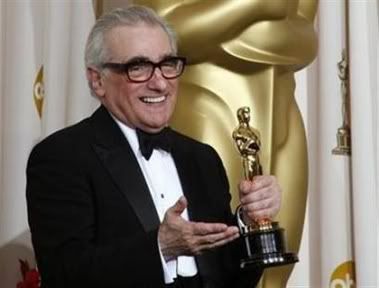
O Scorsese ganhou! Hip-Hip-Urra! Hip-Hip-Urra! Hip-Hip-Urra! O Alan Arkin também! E o Michael Arndt também! E o Al Gore idem, idem, aspas, aspas! E o Alejandro González Iñárritu foi para casa de mãos a abanar. Yes!
(Este ano, pela primeira vez desde 2004, não vou poder ir ao Fantas porque estarei a passear pelas ruas de Londres. Parece-me uma troca justa.)
25 fevereiro 2007
Antes da noite de hoje
Women Acting Badly
An adulteress, an evil boss, an emotional predator: Our reporter on why mature, flawed and powerful women are at the center of this year's Oscar race
Judi Dench has played some dark characters in her time, but few have been as toxic as Barbara Covett in "Notes on a Scandal." A dour schoolteacher with a bad haircut and thick ankles, Ms. Covett describes herself as "chronically untouched" as she prowls after a younger female colleague. She refers to a portly colleague as a "pig in knickers," and confides in a voiceover: "Lasagna tends to disagree with my bowels."
Ms. Dench's diabolical character is in good company. She is one of five Academy Award contenders for best actress in a field dominated by women behaving badly. From the bitchy fashion editor depicted by Meryl Streep in "The Devil Wears Prada" to Kate Winslet's adulterous wife in "Little Children," this year's nominees depict women who are flawed, sharp-edged and often morally unattractive. Perhaps most uncharacteristic for Hollywood, three of the best actress nominees are in the AARP demographic -- Ms. Streep is 57 years old, Helen Mirren is 61 and Ms. Dench is 72.
The year's field is a sea change for an industry that has been criticized for relegating women to roles that are secondary, docile and often younger than 40. The Academy Award for best actress is nearly always reserved for something more traditional. In the past 20 years, the winners have included lightweight romantics (Gwyneth Paltrow in "Shakespeare in Love"), heroines (Julia Roberts in "Erin Brockovich") and sympathetic crusaders (Susan Sarandon in "Dead Man Walking").
This year's ladies are in a beastly league of their own -- starring as the powerful centerpiece of women-driven movies. The best-actress rivals also include Penélope Cruz in "Volver," a portrayal of a working-class mother who covers up the murder of her husband by dumping him in a freezer. The favorite is Ms. Mirren, who plays Elizabeth II in "The Queen": She depicts a stern monarch who is determined to maintain a stiff upper lip after Princess Diana's death, despite criticism from the British public that she was cold and unfeeling.
The parts reflect audiences' desire for a greater sense of reality and complexity in movie roles. As Hollywood has struggled in recent years to draw crowds for its high-budget and often formulaic "popcorn" movies, audiences have shown they're more receptive to edgier stories and unflattering characters, filmmakers say. They also say viewers want to see women playing roles long reserved for men.
Looks Like the Queen
That has filmmakers courting a pool of talented leading actresses, many of whom came to fame in the 1960s and 1970s and are eager to take on more challenging characters. Writers are creating roles specifically for them. "The Queen" was developed after one of the producers noticed how much Ms. Mirren looked like Queen Elizabeth II.
"Filmmakers are writing roles for women that don't fit into the standard boxes of romantic comedy or sidekick to the male lead," says Amy Israel, head of production and acquisitions at Paramount Pictures' specialty arm Paramount Vantage, who has a number of movies starring strong, aggressive females rolling out this year.
There have been such roles before, of course. In 1950, Bette Davis rocked Hollywood with her gritty performance as an aging actress in "All About Eve." Ms. Davis was in her 40s and had long complained about being considered a Hollywood has-been. The same year, Gloria Swanson made a splash with her role as a washed-up movie star in "Sunset Boulevard." At the 1991 ceremony, Kathy Bates's obsessive wacko in "Misery" trumped Ms. Roberts's hooker-with-a-heart-of-gold in "Pretty Woman." More recently, Charlize Theron received a nod for her fierce prostitute-turned-serial killer in "Monster." But rarely has there been such a concentrated group as this year's Oscar bunch.
Audiences can expect to see more of the same. Ms. Mirren is expected to return in "Angel Makers," about women turning murderous in a British farming community after falling for German POWs while their husbands are at war. Nicole Kidman and Jennifer Jason Leigh act out a thorny relationship between sisters in "Margot at the Wedding." In "The Other Boleyn Girl," Natalie Portman plays the ruthless and scheming Anne Boleyn, who steals King Henry VIII from her pregnant sister Mary. Viewers will also see another familiar name, Julie Christie: In "Away From Her," she plays a woman with Alzheimer's who torments her husband by falling for a wheelchair-bound mute.
It's a shift from the conventional wisdom of even a few years ago, that Oscar-hungry actresses should play victims or heroines with unassailable morals. Ms. Winslet herself spoofed the stereotype in a guest turn in 2005 on HBO's "Extras," a comedy about actors' behind-the-scenes life. Ms. Winslet figures she's a shoo-in for a statue for playing a pious nun in a World War II film. "If you're doing a film about the Holocaust, you're guaranteed an Oscar," she says. Later in the satire, she sees a girl with cerebral palsy and advises another actor to take note. "That is another way you win," the character says. "Daniel Day-Lewis in 'My Left Foot'? Oscar. Dustin Hoffman, 'Rain Man'? Oscar."
Patrick Marber, who adapted "Notes on a Scandal" for the big screen, says audiences are bored with the artificial perfection that Hollywood has historically portrayed. "Audiences don't want the defanged version," he says. When it came to the role of Ms. Covett, Mr. Marber didn't hold back. Instead, he ramped up the character from the Zoë Heller bestseller. "She's white-hot vicious," says the writer, who is nominated for his screenplay.
Ms. Dench didn't hold back on the physical transformation, either. In one scene, she's shown slumped in a bath, her flabby, liver-spotted arms rolling over the top of the tub, as she draws on a cigarette. Ms. Mirren, meanwhile, layered on the wrinkles, padding and dowdy outfits. The most striking scene in "The Devil Wears Prada" shows Ms. Streep's character -- the haughty, controlling and immaculately turned-out editor of a fashion magazine -- looking haggard and devoid of makeup after learning that her latest husband wants out of the marriage. Ms. Cruz filled out her behind with padding and takes on an "ugly beautiful" appearance. Even Ms. Winslet's afternoon lover in "Little Children" describes her as having eyebrows that are too thick and a far-from-perfect body.
"Babel" scribe Guillermo Arriaga says moviegoers are drawn to complex, too-human characters as their real lives become more sanitized -- meeting people online instead of in person, for example, and becoming detached from how their food is raised. "People are hungry for real human experience," says the Mexican-born writer, who is nominated for his screenplay. He believes viewers still want to feel a sense of hope but they're willing to go to "dark places" to get there.
Other factors may have prepared viewers for imperfection. The boom in reality TV shows -- such as "Beauty and the Geek," in which socially challenged men humiliate themselves in learning how to win over women -- has shown that unflattering characters sell. The rise of DVDs, especially through Netflix, has boosted audience sophistication by making more movies available to more people. And studios have perfected their indie-movie marketing chops, becoming adept at selling tougher material.
Politically Incorrect
The fact that many recent women-driven movies don't follow the so-called feminist narrative seen in 1970s movies such as "Alice Doesn't Live Here Anymore," which portrayed strong women improving their lot in life, also suggests an evolution in the female role in cinema, says Linda Williams, a professor of film studies at University of California at Berkeley. In "Little Children," for instance, Ms. Winslet's character doesn't break free of her unhappy life. Instead, she returns to it. Similarly, Ms. Dench's role as a scheming, repressed lesbian would have been deemed politically incorrect 20 years ago. Now it is simply "complex."
Still, there's a Hillary Clinton aspect to these roles: A more empowered female audience wants to watch empowered women. Interestingly, men do, too. "These are strong, powerful, edgy, opinionated women," says producer Beau Flynn. "Guys find that sexy." Adds Mr. Marber: "Men enjoy watching the active, protagonist women more than the passive weepers."
This year's field also is a shift for female actresses who have long complained they couldn't find decent roles once they hit 50. "The baby boom is hitting 60," says Robert Sklar, professor of cinema studies at New York University. "It's partly demographic but this is a group that is also particularly self-aware -- narcissistic, some would say -- and they're interested at looking at themselves in movies as older people."
Laura Carstensen, professor of psychology and director of the Stanford Center on Longevity, notes that an aging population is naturally more female skewed. Older people also look for something different in their entertainment. "People's motivation changes as they age," she says. "They look for more meaning."
The Academy is aging as well, which could work in older actresses' favor. Still, Ms. Dench may not relish her chances against Ms. Mirren, who has walked away with the usually predictive Screen Actors Guild award. Ms. Dench is having an operation on her knee and won't be attending the awards ceremony this weekend.
By Merissa Marr, The Wall Street Journal
February 23, 2007
21 fevereiro 2007
Do arco da velha
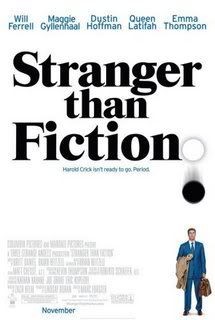
Ele há coisas... Há coisas que não se entendem. Não é que o Stranger Than Fiction do Marc Forster não me sai da cabeça? Mesmo depois de ter visto A Rainha do Stephen Frears, os dois lados do Clint Eastwood e o Little Children com a “minha” Kate Winslet? Não consigo perceber porquê mas aquele mundo literário não me abandona. É verdade que já tinha saudades da Emma Thompson e que gostei mesmo de a ver assim, com olheiras e sem maquilhagem. Também é certo que há meses que não me divertia tanto com uma personagem do Dustin Hoffman – o meu faz-tudo preferido. Mas dois actores não são motivo para um filme não me sair da cabeça, pois não?
Por outro lado, e numa perspectiva meramente pessoal, também conta o facto de ter uma prima a participar no filme. Quer dizer, não é que ela faça mesmo parte da equipa mas sempre que a Ana Pascal entrava em cena, era a minha prima que eu via. (Às vezes acontece-me isto: ter amigos ou familiares que também vivem no cinema.)
Mas recuemos um bocadinho. O argumento deste Stranger Than Fiction rima com as histórias geniais do Charlie Kaufman e isto já me parece um bom motivo para ter gostado tanto deste filme. Mas não é só isso. A verdade é que este filme liberta qualquer um do habitual marasmo em que transformamos a vida. Às vezes, canso-me da qualidade indiscutível e só me apetece ver películas contestáveis. É nessas alturas que descubro raridades como esta em que tudo é analisado... O livre-arbítrio, a efemeridade, o estoicismo, a compulsividade… Está lá tudo. Mas de uma forma tão inteligente e tão deliciosamente pungente que só me apetecia não ter saído da sala de cinema. Queria ter ficado por lá, a observar a estante do Professor. Ou então à chuva, ali mesmo ao lado da escritora, a ouvi-la falar sobre a morte. Podia ser que me habituasse à ideia.
Por outro lado, e numa perspectiva meramente pessoal, também conta o facto de ter uma prima a participar no filme. Quer dizer, não é que ela faça mesmo parte da equipa mas sempre que a Ana Pascal entrava em cena, era a minha prima que eu via. (Às vezes acontece-me isto: ter amigos ou familiares que também vivem no cinema.)
Mas recuemos um bocadinho. O argumento deste Stranger Than Fiction rima com as histórias geniais do Charlie Kaufman e isto já me parece um bom motivo para ter gostado tanto deste filme. Mas não é só isso. A verdade é que este filme liberta qualquer um do habitual marasmo em que transformamos a vida. Às vezes, canso-me da qualidade indiscutível e só me apetece ver películas contestáveis. É nessas alturas que descubro raridades como esta em que tudo é analisado... O livre-arbítrio, a efemeridade, o estoicismo, a compulsividade… Está lá tudo. Mas de uma forma tão inteligente e tão deliciosamente pungente que só me apetecia não ter saído da sala de cinema. Queria ter ficado por lá, a observar a estante do Professor. Ou então à chuva, ali mesmo ao lado da escritora, a ouvi-la falar sobre a morte. Podia ser que me habituasse à ideia.
Malditos 113 minutos de duração!
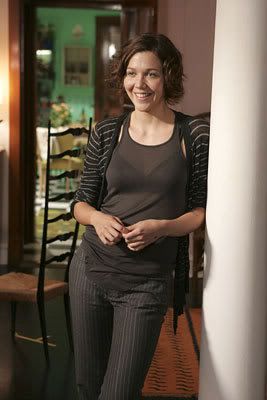
05 fevereiro 2007
Do you feel the same?

De facto, segundo Nietzsche, toda a função da arte é produzir uma base inteligível que torne suportável a insegurança humana.
(...)
Daí que não possamos copiar por palavras uma pintura. Podemos apenas desejar sermos capazes de suscitar com as nossas palavras uma cadeia de associações parecidas, mas estas são subjectivas para o espectador e não repetem, de todo, o enunciado original.
Mark Rothko, 1903 – 1970
(...)
Daí que não possamos copiar por palavras uma pintura. Podemos apenas desejar sermos capazes de suscitar com as nossas palavras uma cadeia de associações parecidas, mas estas são subjectivas para o espectador e não repetem, de todo, o enunciado original.
Mark Rothko, 1903 – 1970
02 fevereiro 2007
Espécie de lembrança nostálgica
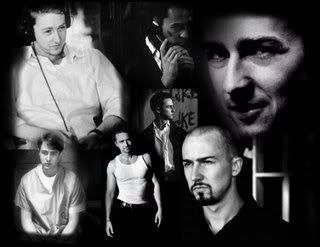
Tenho saudades do Edward Norton. Não do último Edward Norton, invulgar ilusionista no filme de Neil Burger. Tenho saudades do outro Edward Norton, amigo da Drew Barrymore, que usava a sua versatilidade como bem queria. Daquele que nunca suplicou pela admiração do público e que, ao mesmo tempo, nunca se transformou num actor orgulhosamente distante.
Sinto falta daquele intérprete que tanto podia ser o assassino maquiavélico de A Raiz do Medo, o apaixonado inveterado de Everyone Says I Love You ou mesmo o falso deficiente de The Score. Queria que ele voltasse. Onde anda o homem que deixou meio mundo boquiaberto com os seus trabalhos em Fight Club, América Proibida e 25th Hour? Personagens tão nuas, reflexos da complexidade das contradições humanas.
Anuncia-se que voltará na companhia de Naomi Watts numa adaptação de um livro de Somerset Maugham. A ver vamos…
Subscrever:
Mensagens (Atom)
